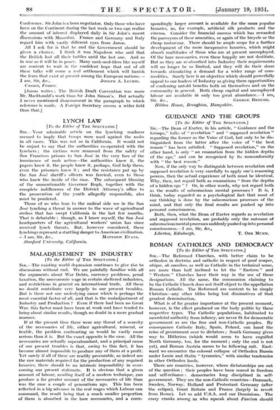MALADJUSTMENT IN INDUSTRY
[To the Editor of THE SPECTATOR.] SIR,—The existing world depression continues to give rise to discussions without end. We are painfully familiar with all the arguments about War Debts, currency problems, penal taxation, the uneconomic wage in certain sheltered industries, and restrictions in general on international trade. All these no doubt contribute very largely to our present troubles. But is there not one underlying cause which is perhaps the most essential factor of all, and that is the maladjustment of Industry and Production ? Even if there had been no Great War, this factor must have been at work and have tended to bring about similar results, though no doubt in a more gradual manner.
If at the present time there were any threat of a scarcity of the necessaries of life, either agricultural, mineral, or textile, the problem confronting us would be vastly more serious than it is. But the exact opposite is the case. All the necessaries are actually superabundant, and a principal cause of our present troubles is that, owing to this fact, it has become almost impossible to produce any of them at a profit. Yet surely if all of these are readily procurable, as indeed are the raw materials required for the production of any required luxuries, there should be no intrinsic impossibility in over- coming our present stalemate. It is obvious that a given amount of labour, availing itself of a modern technique, pan produce a far greater amount of the necessaries of life than was the case a couple of generations ago. This has been reflected in a big advance in the real wages which Labour can command, the result being that a much smaller proportion of them is absorbed in the bare necessaries, and a corre-
spondingly larger amount is available for Ahe more popular luxuries, as, for example, artificial silk products and .the cinema. Consider the financial success which has rewarded the purveyors of these amenities, or again of the bicycle or the cheap motor-car. There should be ample scope for a further development of the more inexpensive luxuries, which might absorb multitudes of those who are at present unemployed. Of the bare necessaries, even these happily are not destitute. But as they are re-absorbed into Industry their requirements will no longer be so limited, and they will do their share towards stimulating a demand for a wider range of com- modities. Surely here is an objective which should powerfully appeal to our leaders of Industry as giving them opportunities of conferring untold benefits both ori themselves and on the community in general. Both cheap capital and unemployed labour are available iii only too great abundance.—I am, Hildon House, Broughton, Hampshire.








































 Previous page
Previous page